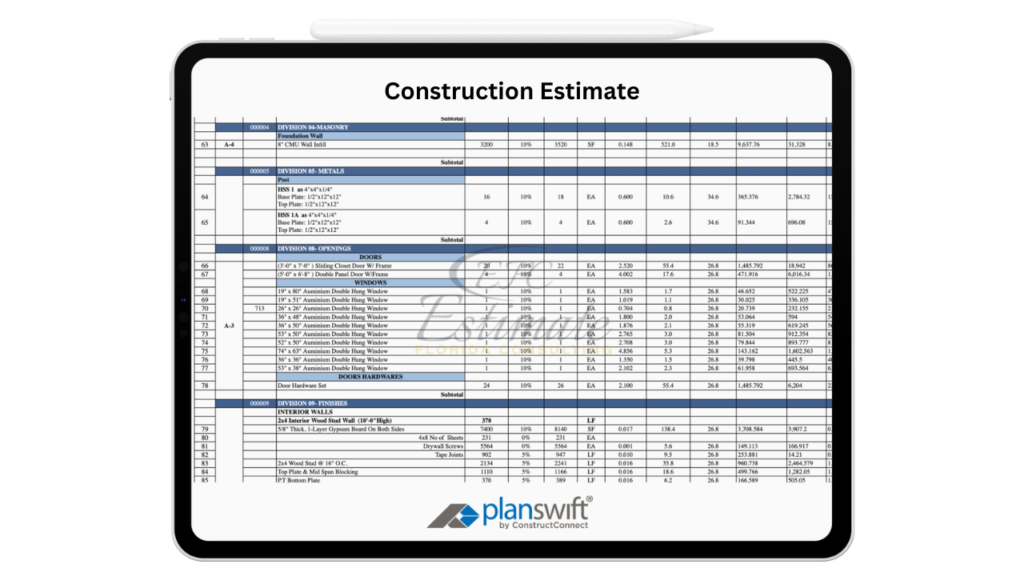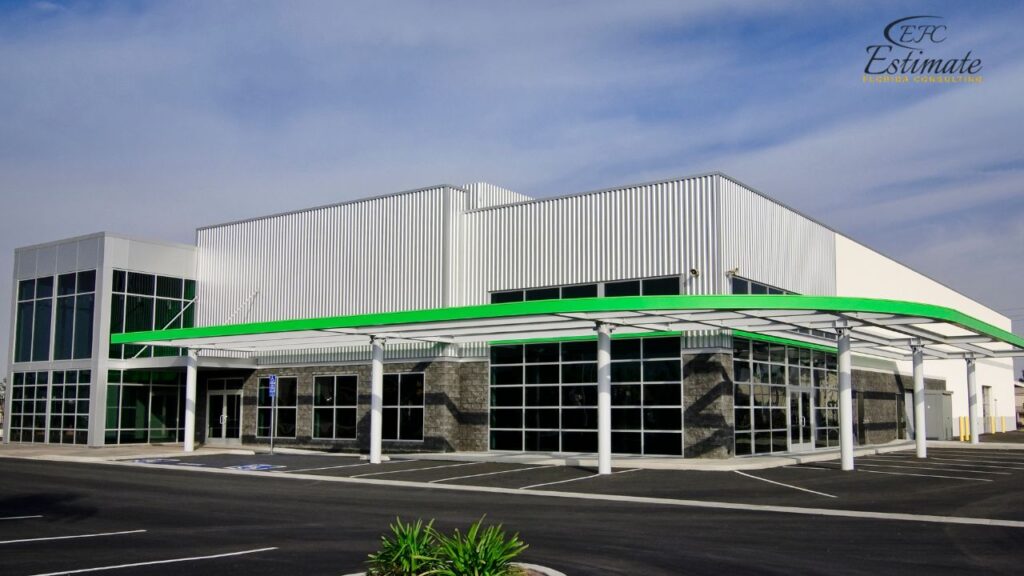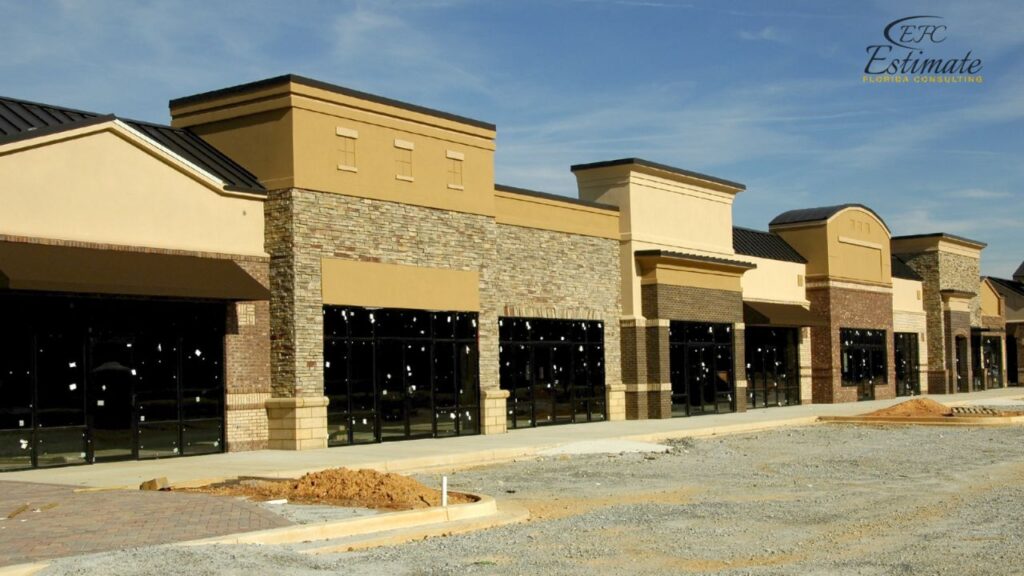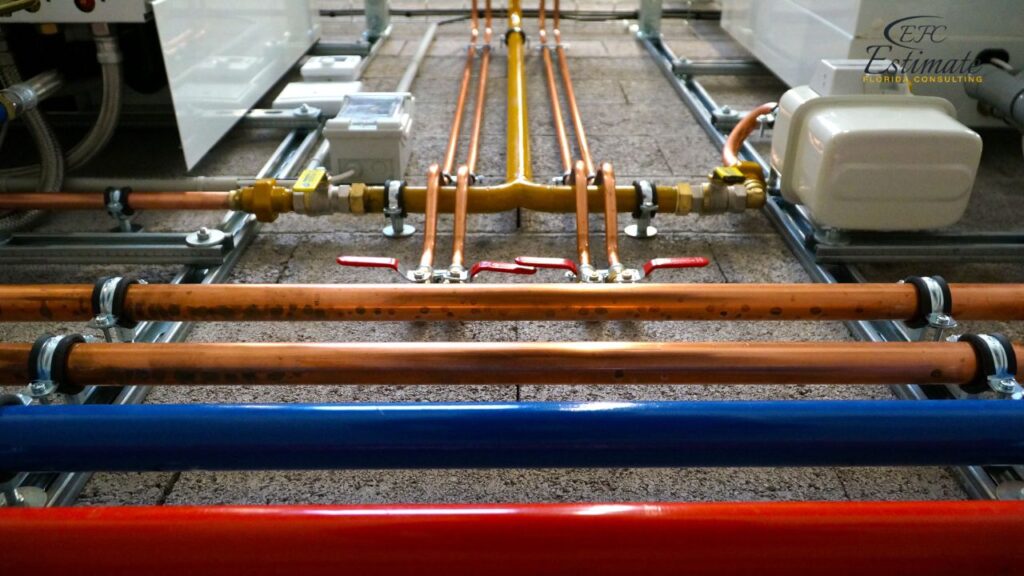90% More Chances to Win Projects With Our Estimate!
- Multi-Family Building
- Hotel Building
- Hospital Building
- Warehouse Building
- School & University Building
- High-Rise Building
- Shopping Complex
- Data Center Building

Building a retail space is a major investment that requires meticulous planning, accurate budgeting, and a deep understanding of the construction costs involved. Whether you’re developing a small boutique store, a larger retail outlet, or even a strip mall, having a precise estimate of the total project cost is crucial to ensuring financial success. At Estimate Florida Consulting, we specialize in providing detailed, reliable construction estimates to help businesses manage their retail building projects effectively.

The cost of constructing a retail building can vary significantly depending on key factors such as the size of the space, location, design, and materials. By considering these variables early on, you’ll be better equipped to anticipate and manage your expenses. Here’s an updated overview of the typical retail building costs:
Retail Building Size | Cost per Square Foot | Total Estimated Cost |
Small Retail Store (1,500 sq ft) | $120 – $240 | $180,000 – $360,000 |
Medium Retail Store (5,000 sq ft) | $144 – $264 | $720,000 – $1.32 million |
Large Retail Store (10,000 sq ft) | $156 – $300 | $1.56 million – $3 million |
Retail Strip Mall (50,000 sq ft) | $168 – $360 | $8.4 million – $18 million |
Smaller retail stores, such as boutique shops or single-unit outlets, typically have lower construction costs due to their smaller size and simpler layouts. These buildings often use more basic materials and require less complex infrastructure. On the other hand, larger retail spaces like department stores or strip malls involve more intricate designs, higher-quality materials, and additional infrastructure requirements, leading to significantly higher construction costs.
Several key factors directly impact the overall cost of constructing a retail building. Knowing these factors can help you estimate more accurately and make informed decisions throughout the project. Below, we explore the main contributors to construction costs and how they affect your overall budget.
The location of your retail building plays a significant role in determining construction costs. Urban areas generally have higher costs due to land prices, labor expenses, and stricter regulations. In contrast, suburban and rural areas tend to offer more affordable land and labor, although they may lack some infrastructure, leading to additional expenses like utility connections. Additionally, site conditions such as soil quality and topography can increase costs if significant land preparation is required.
Choosing the right location is not just about the upfront costs, though. Urban retail spaces often provide higher foot traffic and visibility, which can contribute to long-term business success. However, developers must balance the higher costs associated with urban construction against the potential return on investment (ROI). A professional estimator can help assess the feasibility of different locations by providing detailed cost comparisons and insights.
Location Type | Cost Range per Sq. Ft. |
Urban | $220 – $350 |
Suburban | $180 – $270 |
Rural | $150 – $220 |
The overall size and layout of your retail building are directly correlated with the cost of construction. Larger buildings require more materials, labor, and time to complete, while smaller projects may be less expensive but still require careful planning. The design complexity also plays a role, as unique architectural features or custom layouts will increase costs. For example, a retail space with high ceilings, specialized lighting, or custom shelving will likely incur higher costs than a simpler, standard design.
When designing your retail space, it is essential to balance functionality and aesthetics. While more intricate designs may enhance the customer experience and boost sales, they can also drive up construction costs. A professional cost estimator can help you understand how different design choices impact your budget, ensuring that you achieve the right balance between visual appeal and cost efficiency.
Material selection is one of the most significant factors in determining the cost of your retail building. The type of materials you choose for the foundation, walls, roofing, and finishes will have a direct impact on both the upfront construction costs and the long-term maintenance expenses. Premium materials like marble, hardwood, or glass are more expensive than basic materials such as concrete or wood, but they can offer durability, energy efficiency, and aesthetic appeal that might justify the higher cost.
Opting for eco-friendly or sustainable materials can also influence the cost, as these materials are often more expensive initially but can provide long-term savings through energy efficiency and reduced maintenance. A professional estimator can help you analyze the cost-benefit of different material options, ensuring that your choices align with both your budget and your long-term goals.

Material Type | Cost per Sq. Ft. |
Basic Materials | $150 – $200 |
Mid-Range Materials | $200 – $250 |
Premium Materials | $250 – $350 |
Labor costs are another critical factor in the total cost of retail building construction. Labor rates can vary significantly depending on the region and the availability of skilled workers. In high-demand urban areas, labor costs tend to be higher due to competition and living expenses, whereas rural areas may offer more affordable labor but may require hiring workers from nearby cities, adding travel expenses.
Specialized labor, such as electricians, plumbers, and HVAC technicians, will also affect costs. Additionally, the project timeline can impact labor expenses, as longer projects may require extended contracts and higher wages. Working with a professional estimator helps you identify potential labor-related challenges and allows for better labor cost management throughout the project.
Building codes, zoning laws, and regulatory requirements are mandatory for any retail construction project. These regulations ensure the safety and legality of the building, but they also come with additional costs. Compliance with local building codes, energy efficiency standards, fire safety regulations, and ADA (Americans with Disabilities Act) requirements can add to your overall budget.
Permit fees, inspection costs, and legal fees are part of the soft costs that are often overlooked in the initial planning stages but can quickly add up. A professional estimator will account for these expenses and ensure that your project complies with all necessary regulations, avoiding costly delays and fines during construction.

Breaking down the costs involved in constructing a retail building helps provide a clear understanding of where your money is going and allows you to manage your budget effectively. Below is a detailed breakdown of the primary cost categories involved in retail building construction.
Before any construction begins, the land must be prepared. Site preparation includes land clearing, grading, and ensuring proper drainage. Depending on the condition of the site, this phase may also involve soil stabilization or erosion control. Additionally, site preparation includes connecting utilities such as water, electricity, and gas to the property.
Site preparation is a critical part of the construction process, as any issues with the land can lead to delays and increased costs later in the project. Proper planning and budgeting for site preparation ensure that the land is ready for construction and that no unforeseen issues arise.
Site Preparation Activity | Cost Range |
Land Clearing & Grading | $5,000 – $25,000 |
Utility Connections | $10,000 – $30,000 |
The foundation and framing of your retail building are essential to its stability and durability. The type of foundation used (slab, crawl space, or basement) and the materials chosen for structural framing (wood, steel, or concrete) will influence the cost of this phase. A strong foundation ensures the building’s longevity, while high-quality framing provides structural support.
The choice of materials for the foundation and framing will depend on several factors, including the size of the building, the soil conditions, and the building’s design. A professional estimator will help you select the right materials and determine the associated costs, ensuring the building’s structural integrity.
Component | Cost per Sq. Ft. |
Foundation (Concrete) | $6 – $15 |
Structural Framing (Steel, Wood) | $20 – $45 |
The roof and exterior finishes protect your building from the elements and contribute to the building’s overall aesthetics. There are several roofing options to choose from, including metal, shingles, and TPO (thermoplastic polyolefin). Each option varies in cost, durability, and energy efficiency. Exterior finishes, such as brick, stucco, or glass, will also impact the overall cost and visual appeal of your retail building.
When selecting roofing and exterior finishes, it is important to consider both the upfront costs and the long-term benefits. High-quality materials may have a higher initial cost, but they can provide energy savings and reduce maintenance costs over time.
Roofing Material | Cost per Sq. Ft. |
Metal Roofing | $10 – $20 |
TPO | $8 – $15 |
Interior finishes transform a bare building into a functional and attractive retail space. These finishes include flooring, walls, lighting, and fixtures, all of which vary in cost depending on the materials and design choices. Higher-end finishes, such as custom lighting or premium flooring materials, will drive up costs, while more standard options can help keep the project within budget.
Interior finishes are also important for creating the desired ambiance for your retail space. A well-designed interior can enhance the customer experience, making the space more inviting and comfortable. A professional estimator can help you choose finishes that balance aesthetics, functionality, and cost.
Interior Finishing Item | Cost per Sq. Ft. |
Flooring (Tile, Carpet) | $10 – $25 |
Drywall Installation | $7 – $15 |
Lighting Fixtures | $5 – $12 |
MEP systems are the backbone of your retail building’s functionality. These systems include heating, ventilation, and air conditioning (HVAC), electrical wiring, and plumbing. MEP systems often represent a significant portion of the total construction cost and are essential for ensuring the building operates smoothly and efficiently.
The complexity and size of the building will determine the cost of these systems. Larger retail spaces with more complex layouts will require more extensive MEP systems. A professional estimator will ensure that your MEP systems are designed and installed to meet the needs of your retail business while staying within budget.

MEP System | Cost per Sq. Ft. |
HVAC Installation | $12 – $25 |
Electrical Wiring | $8 – $15 |
Plumbing System | $10 – $20 |
Managing your construction budget effectively is crucial for ensuring the success of your retail project. Here are some practical tips for optimizing costs and staying within budget.
Selecting cost-effective materials is one of the most effective ways to control construction costs. While premium materials may offer more durability and visual appeal, they may not always be necessary. Opting for mid-range materials that provide a good balance between cost and quality can help keep your project within budget without compromising on functionality or aesthetics.
Unexpected challenges are a common part of any construction project. Weather delays, material shortages, or unforeseen site issues can all lead to cost overruns. It is essential to include a contingency budget of 10-15% of the total project cost to account for these unforeseen expenses. Planning for contingencies ensures that you are prepared to handle any unexpected situations without derailing your project.
Choosing the right contractor is critical for the success of your retail building project. Reliable contractors will provide high-quality work, adhere to timelines, and help manage costs. Before hiring a contractor, thoroughly vet their experience, review their previous projects, and ensure they have a solid understanding of local building codes and regulations.

A professional retail building construction cost estimator brings valuable expertise to your project. They help ensure that your estimates are accurate and detailed, allowing you to avoid costly surprises and keep your project on track. Estimate Florida Consulting offers expert estimation services, covering everything from initial site preparation to final finishes.
Even with a professional estimator on your side, it’s important to avoid common mistakes that can lead to budget issues. Below are some of the most common pitfalls to watch out for during the construction process.
Many developers focus primarily on the hard costs of construction, such as labor and materials, while neglecting soft costs like permits, legal fees, and architectural services. These expenses can add up quickly and should always be accounted for in your initial budget estimate.
Unexpected delays are a reality in construction, whether due to weather conditions, material shortages, or labor availability. Failing to plan for delays can cause your project to go over budget and extend the timeline. Always include buffer time in your schedule and a contingency fund in your budget to accommodate any unforeseen circumstances.
Retail building construction is a complex process that requires careful planning, accurate cost estimation, and skilled execution. By understanding the various cost factors and working with a professional retail building construction cost estimator, you can ensure that your project stays within budget and is completed on time. Estimate Florida Consulting offers expert estimating services to help you navigate every step of the construction process and ensure the success of your retail project.
The cost to build a retail store varies depending on factors like size, location, design, and material choices. For instance:
Location plays a big role in construction costs. Building in urban areas typically costs more due to higher land prices, labor rates, and strict regulations, whereas suburban and rural areas are more affordable but may incur additional costs for infrastructure. For example:
The size and layout of your retail space directly affect construction costs. Larger buildings need more materials, labor, and time. Complex designs, like custom lighting or unique architecture, add to the cost. Working with an estimator can help ensure your design choices align with your budget.
Materials significantly impact the cost. Basic materials like wood or concrete are more affordable, while premium options like marble or glass are more expensive but offer long-term benefits such as durability and energy efficiency. Estimated material costs range:
Labor costs depend on the region, labor availability, and the complexity of the project. Urban areas tend to have higher labor costs due to competition and living expenses. Skilled workers such as electricians, plumbers, and HVAC technicians will also increase costs. Accurate labor cost estimation is crucial to avoid unexpected expenses.
Regulatory fees, including permits, building codes, and compliance with safety regulations, are necessary for any retail construction project. These fees can add up quickly and should be factored into your initial budget. Estimate Florida Consulting includes these costs in our detailed estimates to ensure your project stays compliant and within budget.
At Estimate Florida Consulting, we offer detailed cost estimates across all major trades, ensuring no part of your project is overlooked. From the foundation to the finishing touches, our trade-specific estimates provide you with a complete and accurate breakdown of costs for any type of construction project.

We take pride in delivering accurate, timely, and reliable estimates that help contractors and builders win more projects. Our clients consistently praise our attention to detail, fast turnaround times, and the positive impact our estimates have on their businesses.
Estimate Florida Consulting has helped us win more bids with their fast and accurate estimates. We trust them for every project!

Submit your project plans, blueprints, or relevant documents through our online form or via email.
We’ll review your project details and send you a quote based on your scope and requirements.
Confirm the details and finalize any adjustments to ensure the estimate meets your project needs.
Receive your detailed, trade-specific estimate within 1-2 business days, ready for your project execution.

561-530-2845
info@estimatorflorida.com
Address
5245 Wiles Rd Apt 3-102 St. Pete Beach, FL 33073 United States
561-530-2845
info@estimatorflorida.com
Address
5245 Wiles Rd Apt 3-102 St. Pete Beach, FL 33073 United States
All copyright © Reserved | Designed By V Marketing Media | Disclaimer